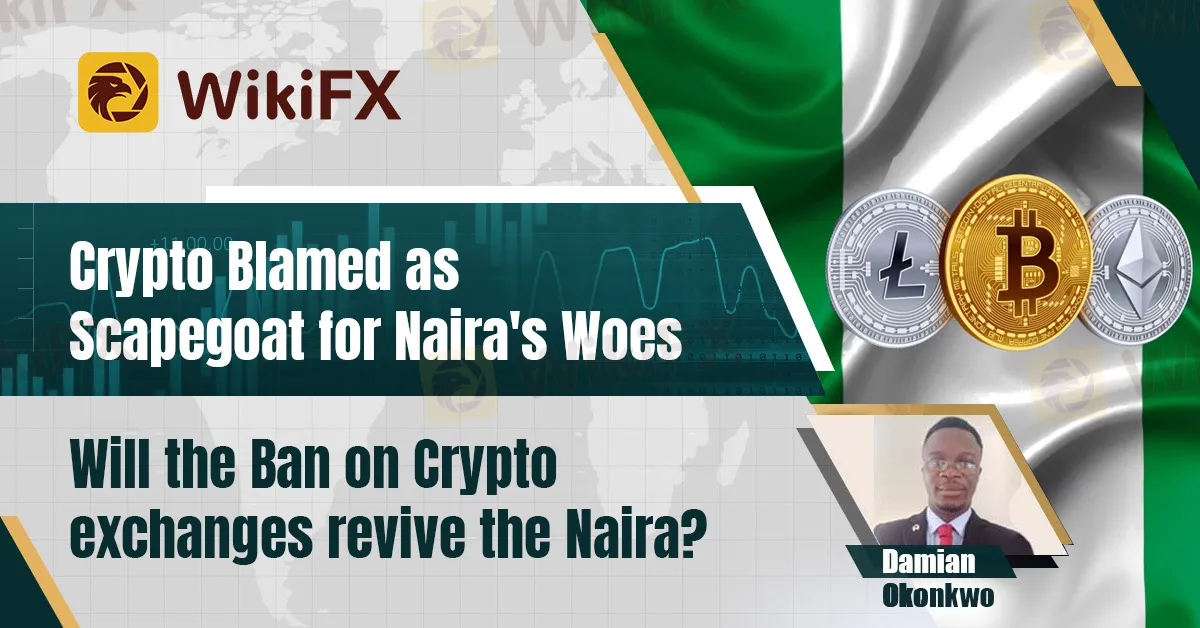简体中文
繁體中文
English
Pусский
日本語
ภาษาไทย
Tiếng Việt
Bahasa Indonesia
Español
हिन्दी
Filippiiniläinen
Français
Deutsch
Português
Türkçe
한국어
العربية
Crypto Blamed as Scapegoat for Naira's Woes, Will the Ban on Crypto exchanges revive the Naira?
Abstract:Nigeria's crypto landscape remains in flux. While the ban may not be the main culprit behind the Naira's struggles, a more nuanced approach is needed.

By: Damian Okonkwo

Introduction
The Nigerian Naira has been on a protracted downward spiral in 2024, leading to finger-pointing and a search for possible causes. Recently, the Nigerian government has pushed the blame to the activities of P2P crypto traders creating high demand for dollars across the trading platforms. Will the ban on Crypto exchanges solve the Naira's woes?
Naira's Woes: A Multitude of Factors
The Naira's struggles stem from a confluence of factors outside crypto. These includes:
1. Global Oil Price Fall: Nigeria is heavily reliant on oil exports. The recent decline in global oil prices has significantly reduced government revenue, weakening the Naira's value.
2. Dollar Scarcity: Lower oil revenue has limited Nigeria's access to foreign exchange, making it harder for businesses and individuals to obtain dollars, further pressuring the Naira
3. High Inflation: Rising inflation erodes the purchasing power of the Naira, discouraging investment and economic activity.
Crypto: Not the Main Culprit
While cryptocurrency use has grown in Nigeria, it's unlikely to be a significant contributor to the Naira's woes. The total volume of crypto transactions in Nigeria is dwarfed by the official foreign exchange market. Additionally, the CBN ban primarily targeted centralized exchanges, not peer-to-peer transactions, which are harder to regulate.
The Ban's Impact: Double-Edged Sword
The CBN's ban on crypto exchanges aimed to curb capital flight and protect Nigerians from potential scams. However, it also:
Pushed Nigerians to Foreign Exchanges: The ban drove some Nigerians to use foreign crypto exchanges, making it harder for the CBN to track financial flows.
Stifled Innovation: Nigeria has a vibrant tech scene, and the ban hinders the development of a local crypto industry that could contribute to economic growth.
Reviving the Naira: A Holistic Approach
The path to a stronger Naira requires a multi-pronged approach:
● Diversifying the Economy: Reducing reliance on oil by promoting other sectors like agriculture and manufacturing can provide a buffer against oil price fluctuations.
● Increasing Foreign Investment: Creating a more attractive investment climate can entice foreign investors to bring in much-needed dollars.
● Taming Inflation: Implementing sound fiscal and monetary policies to curb inflation is crucial for stabilizing the Naira.
The Future of Crypto in Nigeria
Nigeria's crypto landscape remains in flux. While the ban may not be the main culprit behind the Naira's struggles, a more nuanced approach is needed. Fostering innovation and creating a regulatory framework for crypto could be more beneficial than an outright ban. Reviving the Naira requires addressing the underlying economic issues and exploring new opportunities, not scapegoating new technologies.

Disclaimer:
The views in this article only represent the author's personal views, and do not constitute investment advice on this platform. This platform does not guarantee the accuracy, completeness and timeliness of the information in the article, and will not be liable for any loss caused by the use of or reliance on the information in the article.
Read more

The Ultimate Guide to Automated Forex Trading in 2025
Modern markets are revolutionized by automated trading systems, which now execute 70-85% of all transactions. These advanced automated trading software solutions, commonly called trading robots or Expert Advisors (EAs), leverage algorithmic precision for automatic trading across forex, stocks, and commodities 24/7. By removing emotional interference and executing trades in microseconds, auto forex trading platforms create fair opportunities for all market participants. For those new to automated trading for beginners, these systems provide disciplined, backtested strategies while significantly reducing manual effort.

How Reliable Are AI Forex Trading Signals From Regulated Brokers?
Discover how reliable AI Forex trading signals are and why using a regulated broker boosts their effectiveness. Learn key factors to evaluate accuracy and enhance your trading.

Top Currency Pairs to Watch for Profit This Week - March 31, 2025
Discover the top 5 currency pairs to trade for profit this week, March 31, 2025—USD/JPY, EUR/USD, GBP/USD, AUD/USD, USD/CHF—with simple strategies and best times.

AI-Powered Strategies to Improve Profits in Forex Trading
Boost Forex profits with AI: predictive analytics, real-time automation, and smart risk management strategies for sharper trades and fewer losses.
WikiFX Broker
Latest News
How Crypto Trading Transforms FX and CFD Brokerage Industry
FCA Warns Against 10 Unlicensed or Clone Firms
CySEC Warns Against 14 Unlicensed Investment Websites
Top Currency Pairs to Watch for Profit This Week - March 31, 2025
Will natural disasters have an impact on the forex market?
Philippines Deports 29 Indonesians Linked to Online Scam Syndicate in Manila
Exposed: Deceptive World of Fake Trading Gurus – Don’t Get Fooled!
AI-Powered Strategies to Improve Profits in Forex Trading
Stock Market Trading Volume Drops by 97.58 Billion Naira This Month
Why does your mood hinder you from getting the maximum return from an investment?
Currency Calculator







